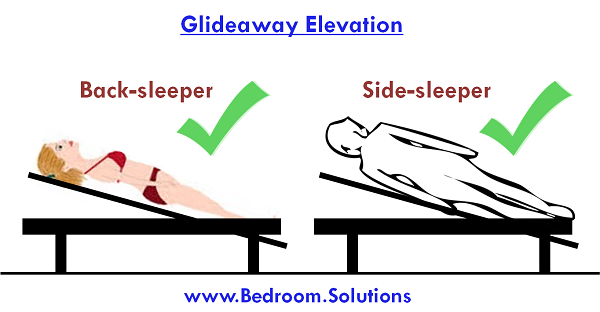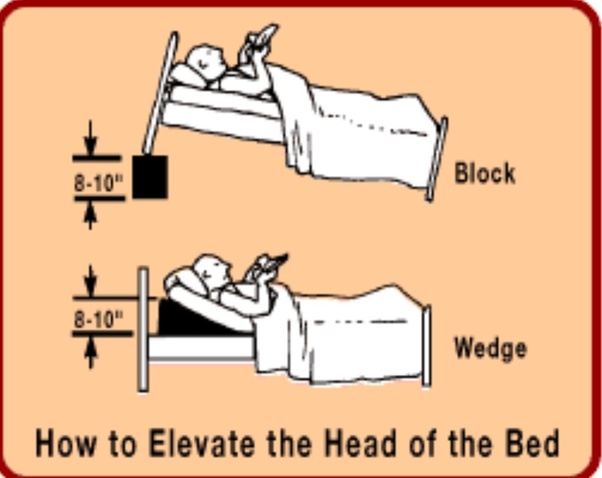Raise your bed 6-8 inches to alleviate GERD symptoms. Optimal height is achieved by using risers or bed wedges.
For individuals suffering from GERD, adjusting the bed height can provide significant relief from symptoms. By elevating the head of the bed 6 to 8 inches, the effects of acid reflux can be mitigated, allowing for a more restful night’s sleep.
This elevation helps prevent stomach acid from traveling up the esophagus while lying down, reducing heartburn, regurgitation, and other discomforts associated with GERD. Simple solutions such as bed risers or wedges can easily achieve the recommended height, promoting improved digestion and overall well-being. Making this adjustment can positively impact quality of life for those managing GERD on a daily basis.

Credit: bedroom.solutions
Understanding Gerd And Its Symptoms
Raise the bed to a higher position to help manage GERD symptoms effectively. By raising the bed, it reduces acid reflux and heartburn, providing relief during sleep. Understanding the impact of bed elevation on GERD symptoms is crucial for improving sleep quality and overall well-being.
What Is Gerd?
GERD stands for gastroesophageal reflux disease and is a chronic digestive disorder. It occurs when stomach acid flows back into the esophagus, causing irritation and various uncomfortable symptoms. This condition affects millions of people worldwide, and it can have a significant impact on their quality of life.
Common Symptoms Of Gerd
GERD can manifest in different ways, and it’s essential to recognize the symptoms to seek appropriate treatment. Here are some common signs to look out for:
- Frequent heartburn: a burning sensation or discomfort in the chest, often after meals or when lying down.
- Regurgitation: the feeling of acid or food coming back up into the throat or mouth.
- Chest pain: a sharp or burning pain in the chest that can sometimes be mistaken for a heart attack.
- Difficulty swallowing: a sensation of food getting stuck in the throat or experiencing a choking feeling.
- Chronic cough: a persistent cough that can be worse at night or after meals.
- Hoarseness or sore throat: a raspy or strained voice and a persistent throat irritation.
- Asthma symptoms: asthma-like symptoms such as wheezing, shortness of breath, or coughing.
If you experience any of these symptoms on a regular basis, it’s crucial to consult with a healthcare professional for an accurate diagnosis. Early detection and treatment can help manage GERD effectively and improve your overall well-being.
Credit: www.gerdhelp.com
Effects Of Bed Height On Gerd Symptoms
The height at which you raise your bed can have a significant impact on GERD symptoms. Understanding the effects of bed height on GERD can help in managing acid reflux effectively.
Link Between Bed Height And Gerd
Higher bed elevation can reduce GERD symptoms by preventing stomach acid from flowing back into the esophagus.
Impact Of Bed Elevation On Acid Reflux
Bed elevation of 6 to 8 inches can help alleviate nighttime heartburn and promote better digestion and sleep.
Recommended Bed Height For Gerd Relief
For optimal relief from GERD symptoms, the recommended bed height plays a crucial role in providing comfort and reducing acid reflux. Elevating the head of the bed can help alleviate symptoms and improve sleep quality for individuals suffering from GERD.
Ideal Elevation Angle
An ideal elevation angle for GERD relief is around 6 to 8 inches. This height allows gravity to keep acid in the stomach and prevents it from flowing back up into the esophagus, reducing the likelihood of heartburn and regurgitation.
Adjustable Bed Options
Consider investing in an adjustable bed that allows you to customize the height to your specific comfort level. With adjustable settings, you can easily find the optimal elevation angle to alleviate GERD symptoms and promote better sleep.
Tips For Raising Bed To Alleviate Gerd
If you are suffering from GERD (gastroesophageal reflux disease), you know how uncomfortable and disruptive it can be. One effective solution to alleviate GERD symptoms is to raise the head of your bed. By elevating your bed, you can prevent stomach acid from flowing back up into your esophagus, reducing acid reflux and providing relief. In this article, we will explore two methods for raising your bed to help ease GERD symptoms: using bed risers and alternative methods for elevation.
Using Bed Risers
Bed risers are a convenient and affordable option for raising the head of your bed. These small platforms are designed to be placed under each bedpost, lifting the entire bed in a stable and secure manner. Here are some tips for using bed risers effectively:
- Choose high-quality bed risers that can support the weight of your bed.
- Ensure that the bed risers are stable and won’t shift or slide.
- Check the height of the bed risers to ensure they provide the desired elevation.
- Place bed risers under all bedposts, ensuring even elevation across the bed.
- Consider using a non-slip mat between the bed risers and the floor for added stability.
Alternative Methods For Elevation
If bed risers are not suitable for your bed or if you prefer alternative methods, there are other options available. Here are some alternative methods for raising your bed:
- Use a wedge pillow to elevate your upper body while sleeping. This can provide similar benefits to raising the entire bed.
- Place sturdy blocks or books under the bedposts to elevate the head of the bed.
- Invest in an adjustable bed frame that allows you to raise the head of the bed to your desired height.
- Consider purchasing a bed base with built-in elevation capabilities.
It’s important to find the method that works best for you and provides the desired elevation to alleviate your GERD symptoms effectively. Experiment with different options until you find the most comfortable and effective solution.
Other Lifestyle Modifications To Manage Gerd
Other lifestyle modifications can play a significant role in managing GERD symptoms. In combination with raising the bed, making dietary changes and adjusting sleep positioning can help alleviate discomfort and reduce the frequency of acid reflux episodes. Implementing these modifications can help individuals effectively manage their GERD and experience a better quality of life.
Dietary Changes
Eating certain foods can exacerbate GERD symptoms, so making dietary adjustments is crucial. Avoiding acidic, spicy, and fatty foods, as well as limiting caffeine and alcohol consumption, can help minimize acid reflux. Consuming smaller, more frequent meals and chewing food slowly and thoroughly can further support digestive health.
Sleep Positioning
Elevating the upper body during sleep, either by using bed risers or a wedge pillow, can aid in managing GERD. Sleeping on the left side is also recommended, as this position may help reduce the likelihood of acid reflux. Furthermore, allowing a few hours to elapse between eating and lying down can prevent stomach acid from backing up into the esophagus.

Credit: sgastro.org
Frequently Asked Questions Of How High To Raise Bed For Gerd
How Elevated Should I Sleep With Gerd?
Sleeping with your head elevated can help alleviate the symptoms of GERD. Elevate your head by using a wedge pillow or raising the head of your bed by 6-8 inches. This position helps prevent stomach acid from flowing back into the esophagus, reducing heartburn and acid reflux discomfort.
How High Should You Raise Your Bed For Acid Reflux?
Elevate your bed 6-8 inches to alleviate acid reflux symptoms by using bed risers or blocks.
What Is The Best Adjustable Bed Position For Gerd?
The best adjustable bed position for GERD is usually with the upper body elevated at a 30-45 degree angle.
Does A Raised Bed Help With Gerd?
A raised bed can help with GERD by elevating the upper body, reducing acid reflux symptoms.
Conclusion
Raising the bed to alleviate GERD symptoms is a simple and effective solution. By elevating the head of the bed, gravity helps keep acid in the stomach and prevents it from flowing back up the esophagus. This natural remedy provides relief without the need for medication or invasive procedures.
Remember to adjust the height gradually to find the most comfortable position for you. Start sleeping with an elevated bed today and experience the positive impact it can have on your GERD symptoms. Your peaceful and restful nights await!
